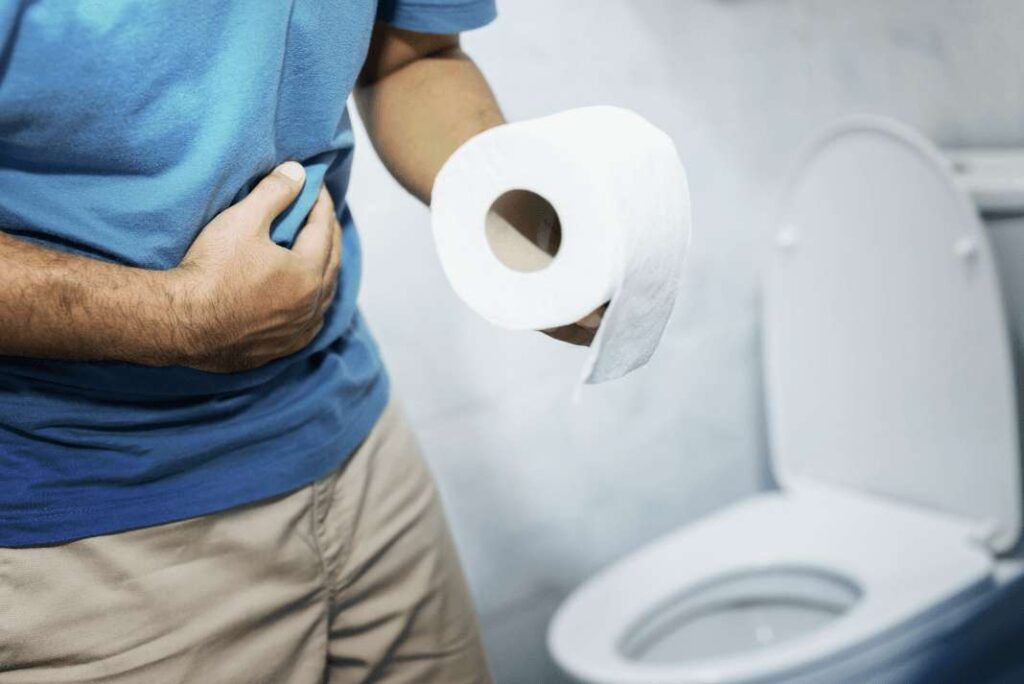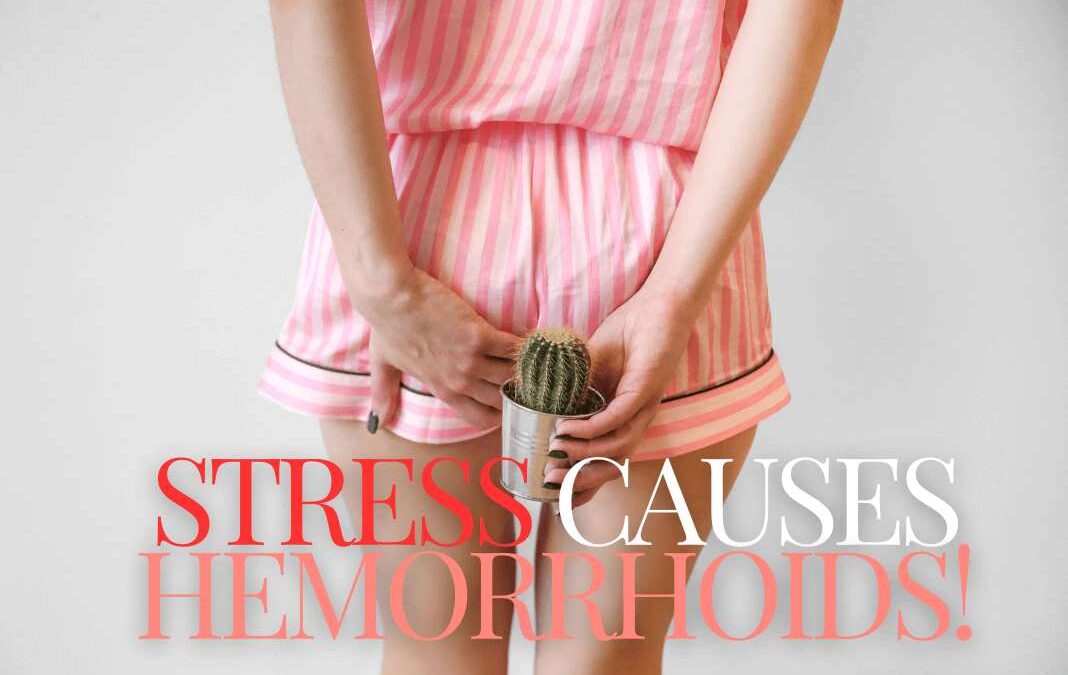Hemorrhoids, those uncomfortable and sometimes painful swollen veins around the anus or lower rectum, are often linked to physical factors like constipation, prolonged sitting, or even straining during bowel movements. However, can stress—an emotional or mental state—play a role in the development of hemorrhoids? so people have confusion that can stress cause hemorrhoids! It may seem like an unlikely connection, but stress can indeed have indirect yet significant effects on the body that might contribute to hemorrhoid flare-ups.
Page Contents
Can stress cause Hemorrhoids? Let’s find out! 👀
The Body’s Response to Stress

When we are under stress, the body reacts in several ways. Cortisol, known as the “stress hormone,” is released, and this can lead to a number of physiological changes.
Digestive disturbances are among the most common effects. You’ve probably heard the saying, “I’m so stressed I feel it in my stomach,” and that’s because stress can interfere with digestion, sometimes causing constipation or diarrhea—two conditions that are both notorious for worsening or causing hemorrhoids.
Stress-Induced Constipation and Its Link to Hemorrhoids
One of the indirect ways stress contributes to hemorrhoids is through constipation. When you’re anxious or overwhelmed, your digestive system may slow down, making it harder for your body to pass stool.
This leads to hard, dry stools that require more straining during bowel movements, putting extra pressure on the veins in the rectal area, which can cause or worsen hemorrhoids.
Think of it this way: stress doesn’t create hemorrhoids outright, but it sets up the perfect conditions for them to develop. The more you strain, the more likely it is for those veins to swell and cause discomfort.
Stress-Related Diarrhea: Another Risk Factor

On the flip side, stress can also trigger diarrhea in some people. While diarrhoea is generally the opposite of constipation, it can still irritate the anal area and create inflammation, leading to hemorrhoids.
Frequent bowel movements, especially when accompanied by straining, can exacerbate or even cause hemorrhoids due to the increased pressure on the rectal veins.
The Vicious Cycle of Stress and Hemorrhoids
To make matters worse, stress can also affect your healing process. When your body is stressed, its ability to repair tissue and reduce inflammation slows down. If you already have hemorrhoids, stress might prolong the healing process, keeping you in discomfort for longer.
It’s not just physical symptoms, though—hemorrhoids can also create a cycle of mental stress. Many people feel anxious or embarrassed about their condition, which can lead to even more stress, worsening the situation. It’s a bit of a Catch-22: stress contributes to hemorrhoids, and hemorrhoids, in turn, contribute to stress.
Managing Stress to Prevent Hemorrhoids
Since stress has such a strong influence on your digestive system and overall health, managing it effectively can be a key step in preventing or reducing hemorrhoid symptoms. Here are a few strategies:
- Mindfulness and Relaxation Techniques: Practices like meditation, deep breathing, or yoga can help regulate stress and prevent digestive problems associated with anxiety.
- Dietary Changes: Incorporating fiber-rich foods can ease digestion and prevent constipation, a common cause of hemorrhoids. Your diet should consist mostly of fruits, vegetables, and whole grains.
- Stay Active: Regular exercise helps with digestion and improves overall circulation, reducing the chances of hemorrhoid formation.
- Hydration: Drinking plenty of water aids in smooth bowel movements and prevents both constipation and the straining that leads to hemorrhoids.
- Limit Time on the Toilet: Spending too much time on the toilet, even for relaxing, can increase pressure in the rectal area, contributing to hemorrhoids.
Final Thoughts
While stress may not be a direct cause of hemorrhoids, it certainly plays a role in creating conditions that make them more likely. Whether it’s through constipation, diarrhea, or simply prolonging healing, managing stress is crucial for preventing and managing hemorrhoids.
So, next time you feel overwhelmed and notice digestive discomfort, it might be worth considering the possibility that your stress is affecting more than just your mind—it could be impacting your body too. By taking steps to lower your stress levels, you’re not only improving your mental health but also helping your body avoid the discomfort of hemorrhoids.
In conclusion, if you’re dealing with hemorrhoids, it’s important to look at your lifestyle and consider stress as a potential trigger. A holistic approach that tackles both mental and physical factors can lead to better outcomes and a healthier, more comfortable you.
FREQUENTLY ASKED QUESTIONS
Can stress directly cause hemorrhoids?
Stress doesn’t directly cause hemorrhoids, but it can lead to conditions like constipation or diarrhea, which increase the likelihood of developing hemorrhoids. Stress can also exacerbate existing hemorrhoids by slowing the healing process.
How does stress affect bowel movements?
Stress can disrupt normal digestive function, often causing constipation or diarrhea. Both conditions can lead to increased pressure on the veins in the rectal area, contributing to the development or worsening of hemorrhoids.
Can stress make hemorrhoids worse?
Yes, stress can make hemorrhoids worse. By affecting digestion and causing constipation or diarrhoea, stress can increase straining during bowel movements, which puts more pressure on the hemorrhoidal veins.
Can anxiety trigger hemorrhoids?
While anxiety itself doesn’t trigger hemorrhoids, the physical symptoms that result from anxiety, such as changes in digestion and bowel movements, can create conditions that lead to hemorrhoids.
What can I do to manage stress-related hemorrhoids?
Relaxation methods such as yoga, deep breathing, or meditation might be helpful in managing stress. A fiber-rich diet, regular exercise, and staying hydrated are also important for maintaining healthy digestion and reducing the risk of hemorrhoids.
Can hemorrhoids cause stress?
Yes, hemorrhoids can cause stress, especially due to the discomfort, pain, and sometimes embarrassment they bring. The cycle of stress and physical discomfort can be difficult to break, but managing both is crucial for relief.
How can I prevent hemorrhoids if I’m under stress?
To prevent hemorrhoids during stressful times, focus on maintaining a healthy digestive system. Eat fiber-rich foods, drink plenty of water, and engage in regular exercise to avoid constipation. Taking breaks for relaxation and stress management can also be helpful.
Does sitting for long periods due to stress increase the risk of hemorrhoids?
Yes, sitting for long periods, especially during stressful situations, can increase pressure in the rectal area, leading to hemorrhoids. It’s important to take breaks, move around, and avoid prolonged sitting to reduce the risk.
Can meditation help reduce hemorrhoids caused by stress?
While meditation won’t directly reduce hemorrhoids, it can help lower stress levels, which in turn can improve digestion and bowel regularity. This can reduce the risk of constipation and straining, which are major factors in the development of hemorrhoids.
Should I see a doctor if I think stress is contributing to my hemorrhoids?
If stress-related hemorrhoids are causing you discomfort or not improving with home care, it’s a good idea to consult a doctor. They can recommend treatments to alleviate symptoms and help you manage stress more effectively.

